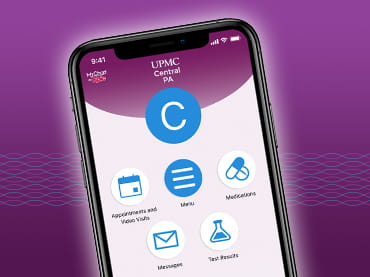Learn about the symptoms, diagnosis, and treatment of reactive airway disease in children, and how UPMC in central Pa.'s asthma specialists can help.
Why Choose UPMC in Central Pa. for Reactive Airway Disease Treatment?
If your child is showing signs of asthma but is too young to have diagnostic testing to confirm that diagnosis, your health care provider may diagnose your child with reactive airway disease. Our specialists offer a full range of tests and treatments for reactive airway disease, including:
Diagnostic Tests for Reactive Airway Disease
- Skin testing. Skin testing, also called scratch testing, exposes your skin to small amounts of allergy-causing substances (allergens) and can identify allergy triggers, such as pollen, dust mites, pets, and mold, that may be causing reactive airway disease.
- Pulmonary (lung) function tests. Lung function tests are noninvasive and provide information about how well your lungs are working. Although children younger than age five are too young to complete lung function tests, they may be used in adults or older children with reactive airway disease to confirm an asthma diagnosis. There are several types of lung function tests, including:
- Spirometry. A spirometry test measures how much air your lungs can hold and how forcefully you can breathe out.
- Lung volume test. A lung volume test measures the volume of air in your lungs and how much air is left in your lungs at the end of a normal breath.
After your first round of lung function testing, your health care provider may give you an inhaled medication called a bronchodilator and ask you to repeat the test(s). Your health care provider will compare your test results to determine if the medication was effective.
Medications for Reactive Airway Disease
- Medications may be able to help treat reactive airway disease or underlying health conditions that are causing it. Some asthma medications are taken to provide quick relief of reactive airway disease symptoms, and other asthma medications are taken daily to provide long-term symptom control. Allergy medications may help if reactive airway disease is related to an allergy. Your health care provider will let you know what type of medication is right for your condition.
Patient Education for Reactive Airway Disease
- Our specialists provide the education and information you need to manage your reactive airway disease, including asthma inhaler and nebulizer instruction, and recommendations for avoiding reactive airway disease triggers.
What is reactive airway disease?
Reactive airway disease (RAD) is similar to asthma. RAD occurs when your bronchial tubes, which bring air into your lungs, overreact to an irritant, swell, and cause breathing problems.
Reactive airway disease is often diagnosed in young children who are showing signs of asthma but who are too young to have lung function testing that can confirm an asthma diagnosis.

What are the symptoms of reactive airway disease?
Reactive airway disease symptoms are similar to asthma symptoms and may include:
- Coughing
- Wheezing
- A feeling of tightness in the chest
- Trouble breathing
- Shortness of breath
Who is at risk for reactive airway disease?
Certain conditions and irritants may trigger or increase the risk of reactive airway disease, including:
- Allergies to pets, dust, pollen, or mold
- Smoke
- Exercise
- Respiratory infections
- Weather changes
- Strong odors, such as odors from perfume or chemicals
How can I prevent reactive airway disease?
Although you may not be able to prevent reactive airway disease itself, there are a few things you can do to prevent flare-ups. You should try to avoid reactive airway disease triggers and follow your health care provider’s instructions for using your medication.
Providers
Locations
UPMC Allergy and Immunology
Located at UPMC Outpatient Center
21 Waterford Drive
Mechanicsburg, PA 17050
Phone: 717-988-9180
Fax: 717-775-5723
Specialty Care ENT – UPMC
508 S. Washington Street
Gettysburg, PA 17325
Phone: 717-334-8171
Fax: 717-334-8172
Specialty Care ENT – UPMC
250 Fame Avenue
Suite 201, (Entrance A)
Hanover, PA 17331
Phone: 717-633-9229
Fax: 717-633-5552
Contact
Need more information?
Many of our providers offer video visits. Call the office or schedule via your patient portal.
Phone: 717-988-9180


















